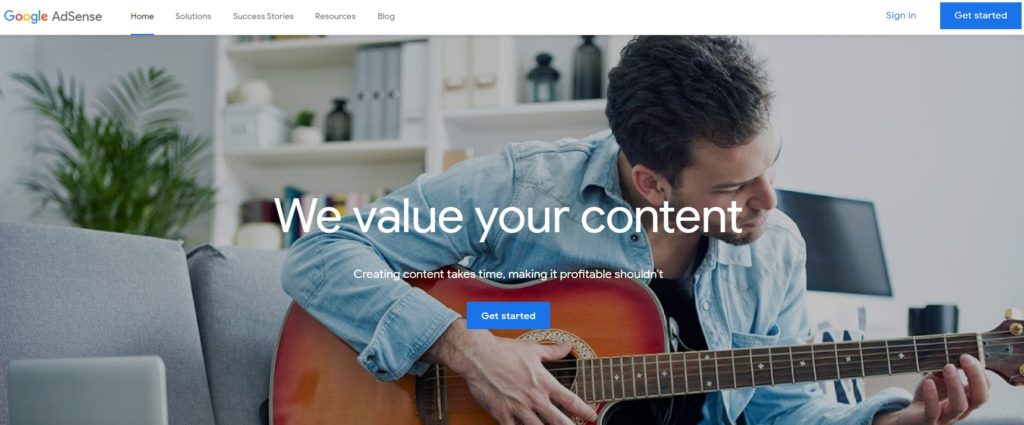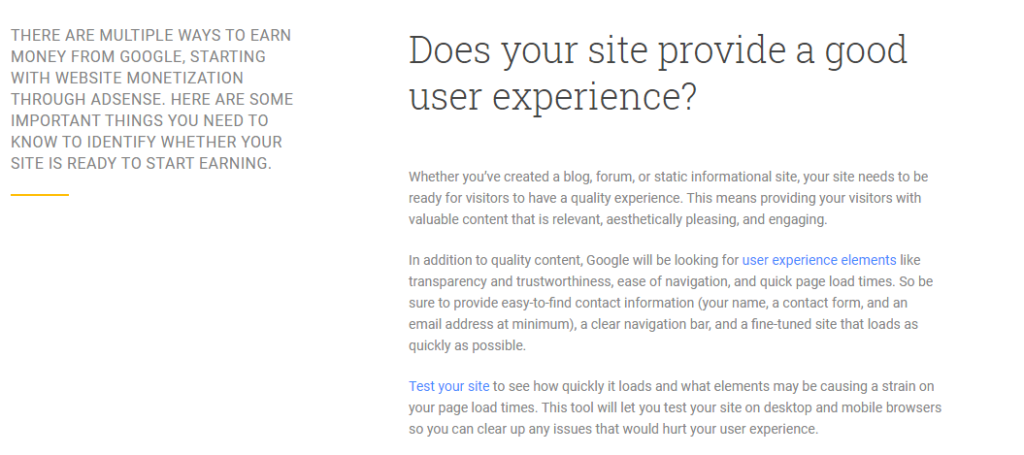Most bloggers want to monetize their blogs, eventually. If you search the web for ‘monetizing blogs’, you will get thousands of links to websites sharing best strategies to monetize your site.
Firstly, almost all of them have something to sell to you for sharing their thoughts on monetization. Secondly, they will preach that it is all about the quality of the content, everything else is secondary. Thirdly, the putative authors of those articles or videos will say that follow the best practices of the program you want to join, and your application for monetizing site traffic will sail right through. Actually, my experience shows that nothing can be further from the truth.
One of the most frequently recommended strategies for monetizing site traffic is to use Google AdSense or something similar. Of course, there are other ways to monetize a site, such as affiliate marketing, creating and selling products, accepting donations, etc., but Google AdSense is very popular with bloggers thinking of monetizing their site. Consequently, Google AdSense and/or affiliate marketing are two strategies that are often recommended by most ‘experts‘ on website monetization.
So, what are the requirements or best practices to follow for acceptance to the Google AdSense program. Gleaning from various sites and forums, you will find the following.
AdSense: rules and requirements
So, in a nutshell, what all the domain experts are telling us is this—in order to be accepted by Google AdSense, you need to meet these criteria.
Firstly, have one of these three types of sites:
- A blog site
- A forum site
- A free online tool site
Furthermore, all these sites should follow AdSense program policies, Google publisher policies, and Google publisher restrictions.
In addition, you need to ensure that your site:
- Provides good user experience
- Content is family friendly and doesn’t violate policies
- Adheres to Google Webmaster Guidelines
- Has a privacy policy
Finally, you need to ensure that:
- The content you publish should be high-quality, unique, niche, original, and authoritative
- You use AdSense approved language
- Your quality of writing is high
- You have a well established site with around 40 to 50 posts, with an average of 1000 words each
- The site uses SSL.
Traffic volume
Kindly note that almost all of the domain experts say that volume of traffic or the domain age aren’t important for acceptance to the program. However, tucked away on this page is this requirement from Google:
“Do you want to learn how to monetize your website with Google AdSense? If so, the most basic of Google AdSense tips are what types of sites make the most money with Google AdSense. The simplest answer is a site that has a lot of content focused on a particular topic with a high volume of traffic. But more specifically, here are the three types of sites you should aim to create if you want to earn AdSense revenue.“
Now, Google doesn’t mention what is considered ‘a high volume of traffic‘—1000, 2000, 5000, 10000 visitors/day. Therefore, although there is a sundry list of dos ad don’ts, one requirement not clearly highlighted by anyone, including Google, is the traffic volume. Matter of fact, as I have mentioned already, most putative domain experts opine that traffic volume is not an important requirement, at all.
AdSense: Opaque rules and vague requirements
Thus, after perusing the requirements for acceptance to the program, I thought to myself, “Hey, except for traffic volume, which isn’t important anyway, I meet all the requirements for Google AdSense. So, let me submit my site for review; it should get approved.“
So, after completing all formalities, I clicked on the ‘submit‘ button. My first submission didn’t complete the approval process because of staffing issues due to COVID-19. However, the second submission was reviewed, but was rejected with the following message:

Rejection note. Unclear and unspecific much?
Now, read the rejection note closely. It states that, ‘it does not meet our program criteria‘; however, doesn’t state which ones.
Furthermore, it states, ‘If you are able to make changes to meet our program criteria, you may reapply for AdSense in the future.‘
Wait, what?
You aren’t telling me which program criteria I am not meeting, yet you want me to make changes to my site to meet your program criteria. Seriously?
Finally, it says, ‘Please note that we may not be able to respond to inquiries regarding specific reasons for our decision.‘
Ok, great! According to Google, I don’t meet the program criteria, but they don’t tell me which program criteria I am not meeting.
However, I can makes changes to my blog to meet the program criteria—I don’t have a clue about which program criteria I don’t meet—and then reapply.
What a great feedback! Kudos to you all for the originality.
Effective Feedback
Now, throughout my corporate career, I was always advised that the best feedback is a feedback that is SMART—Specific, Measurable, Achievable, Realistic, and Timely. Consequently, I have practiced that mantra all my life. Most importantly, searching Google for ‘rules for giving feedback‘ returns the following results, the top 5:
9 Rules for Effective Feedback
6 Rules For Effective Feedback
The 12 Simple Rules of Giving Feedback
The Four Rules of Effective Feedback
8 Golden Rules for giving feedback
Can you guess, what all of them list as one of the rules for giving an effective feedback?
Yep, you got that right. It says, ‘Be specific.‘
So, some of the best sites out there say ‘give specific feedback‘, yet Google’s feedback to content creator is as vague as it can be.
Go figure!
Help from AdSense community forum
The response from Google was not helpful to me in any way. As far as I can tell, Omygdala:
- Publishes unique content
- Publishes content that are family friendly and doesn’t violate policies
- Has high quality of writing
- Is 4 years old and has 53 blog posts and 8 pages
- Uses SSL
- Follows, to the best of my knowledge, AdSense program policies, Google publisher policies, and Google publisher restrictions.
- Has a privacy policy
- Has an About me page
Therefore, I sought help from the AdSense community. Next, I posted the following question in the AdSense community forum.

What’s wrong with Omygdala?
My question generated the following response

Hey Google! A product expert says he can’t see anything obvious.
So, one of the product experts didn’t find ‘anything obvious that doesn’t meet the program criteria.‘
The person, however, did make an observation about the low traffic volume of my site. I responded thus:

My response to the product expert.

My response to the product expert
Basically, I told him three things:
- Firstly, my traffic was split 50/50 between organic search and direct.
- Secondly, based on my research and observations, for Google, traffic volume is the single most important selection criterion to be accepted by AdSense; everything else is secondary—an eyewash.
- Finally, I brought attention to a few web sites the violate Google’s program and publisher policies, and restrictions, yet AdSense has partnered with them just because they are high volume sites.
The above response of mine elicited the below response from another product expert. This person’s response was the nicest thing I have heard about myself and my blog in a long time.
The person thought that my site’s About Me page was ‘one of the best, if not the best, about-me pages that will ever be seen in AdSense forum.‘
That’s a wonderful thing to know, eh!

Another product expert responds and says I have one of the best, if not the best, About me pages.

Do what your heart tells you and your mind justifies! Yup, that’s what I am gonna do.
Furthermore, the product expert advised me not to change my site or my writing style to get approved, and maybe I should stick to my site’s slogan and look at other means of monetization
So, two product experts did not find anything wrong with my site. Both of them had some nice things to say about my site, yet Google had rejected my request saying that I did not meet the program policies.
Way to go, Google! Go, conquer the world. Wait, you have done that already. Ignore that, then.
Big fish, little fish
According to Wikipedia, Google AdSense serves ads on over 11 million sites. In 2014, it accounted for 22% of Google’s total revenue. So, AdSense is a cash cow for Google, I’d say. And you will not make that kind of money if the sites you partner with doesn’t have enough traffic volume.
So, I do understand that it makes business sense for Google to give primacy to site traffic over everything else while reviewing sites for acceptance to the AdSense program. Therefore, we shouldn’t be surprised that, for AdSense, all that matter is website traffic volume, content be damned. You may have the most original content, but if your traffic volume is abysmal, then you will never get approved for the program.
Therefore, Google needs to be open about it. Why hide behind the excuse of program policies while rejecting sites, when you can just say that you don’t have enough traffic volume for us to make money off you.
Be bold, Google! You own the world anyway. So, you can tell it on our face. We are grown up, we aren’t snowflakes, and we will not be offended if you speak the truth about your business policies.
To be fair though, on Types of Sites Having Quality AdSense Revenue page, Google does mention ‘site that has a lot of content focused on a particular topic with a high volume of traffic‘ make the most money.
However, if you go to the AdSense Home Page, Google makes it look like it is a walk in the park to get accepted to the AdSense program.
I find it hilarious that their slogan is, ‘Creating content takes time, making it profitable shouldn’t.‘
Seriously? That’s simply not true.
I know, because I have tried. I have quality content and you have rejected my application.

We value your content. No, you don’t. You value the traffic.
Screenshot source: Google
By the way, shouldn’t you have a footnote associated with that slogan, which should effectively read, ‘You will need to have a high volume of traffic and should be compliant with AdSense program policies, Google publisher policies, and Google publisher restrictions.‘ That makes the slogan and requirements of the program complete, and leaves no doubts in the mind of the content creators wanting to get an AdSense account. Anything else and you are being disingenuous and dishonest in your marketing campaign.
As I have said, be truthful. We will not take offence. You are too big, anyway, for little people like us, the content developers.

















